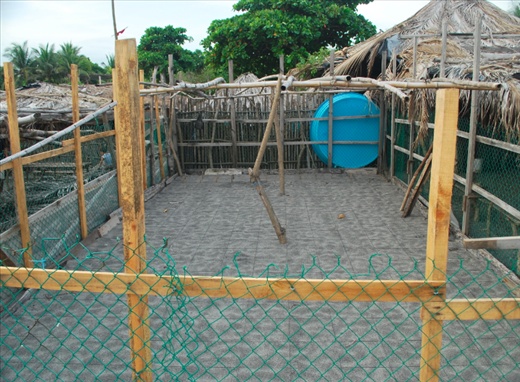“Possessing, selling, and consuming sea turtles is illegal in El Salvador,” states Enriqueta Ramirez in Spanish. “We are not interested in buying turtle eggs from you; we want to collaborate with you to protect sea turtles.” With these strong statements, Enriqueta is confronting a challenging history; a young female conservationist trying to change the paradigm of a male dominated culture of turtle egg exploitation.
Enriqueta’s audience is a group of about 50 turtle egg collectors, almost exclusively men, ranging from about 15 to 60 years of age. These men listen respectfully for the most part; its clear who is in charge of this meeting. The dynamic young leader of ViVAZUL, one of El Salvador’s leading turtle conservation organizations, controls the purse strings at this conservation project. Her organization (the Spanish translation of “Live Blue”) works with professional egg collectors to protect turtle eggs at three local hatcheries, where the eggs are protected until they hatch.

ViVAZUL is among the most effective turtle organizations in the country. An initiative of Fabien Cousteau’s organization Plant A Fish, VivAzul has helped to save more than 400,000 turtle hatchlings in its two years of existence. I have come to visit this olive ridley turtle nesting beach in the small coastal village of Toluca on El Salvador’s central coast with Enriqueta to learn how turtle conservation is working in this small Central American country.
Toluca is not a town you’ll find on the map. Few tourists come to see the turtles or relax on its sandy beach. The 40 families here live in small compounds stretched out along the coast, with walls of bamboo marking the property of each family. The town’s kids know how to enjoy the benefits of ocean front living, swimming playfully in the surf as a pastel sunset plays out over the coastal hills to the northwest.
Enriqueta first visited Toluca a decade ago as a young graduate student. Back then, before the sale of turtle eggs was banned, the most that conservationists could do was to request that egg collectors donate a dozen eggs per nest (roughly 10% of an average nest) to the hatchery. In February 2009, the government of El Salvador announced a veda, a ban on the consumption, sale, and possession of turtles, their eggs, and turtle products) in conjunction with a project funded by US Agency for International Development (USAID) to purchase turtle eggs from local residents who collect them.
As an emergency measure, the new law has been successful. Over the past two years, roughly 80% of the turtle eggs in the country have been protected (about 1.5 millions eggs protected per year). However, Enriqueta and other turtle experts believe the egg purchasing program will not be sustainable over the long-term. Much of the money for the program has come from US AID funding, which will run out in two years. To get started on what to do after 2014, a group of leading organizations is working together to craft plans to replace the funds from other sources and invest in environmental education.
After Enriqueta finished explaining how a new system of ID’s would work during this nesting season, she methodically took the picture of all of the participants with her new iPhone. Quickly the tortugueros settled into groups, playing cards and smoking cigarettes. Enriqueta and I took advantage of the down time to interview a number of the men.
The prevailing wisdom of turtle conservationists in the country is that collecting turtle eggs is a primarily economic activity; as long as the money can be replaced, the eggs will be protected. Enriqueta, however, believes that there are social factors at work. When asked to describe what its like to meet up every night to go “turtling”, the guys used words like “pastime” and “sport”.
I’ve gone out to patrol on turtle nesting beaches more than 100 times but walking the beach at Toluca was a very different experience. I’m used to the mostly deserted turtle beaches of Costa Rica where researchers control the beach and poachers avoid confrontations. Here in El Salvador, the tortugueros stake out their position along the beach, spaced out every 50 feet or so, standing on the water’s edge like sentries awaiting a beach landing. We didn’t see any turtles this early in the season, but the walk was as much of a learning experience as any beach patrol I’ve ever done.

Without programs like this one, nearly every turtle egg in El Salvador would be consumed. The country has roughly 4,000 tortugueros, spread out along every major nesting beach in the country. For most of these people, primarily men, the money earned from selling the eggs (either to a hatchery or the black market) is supplemental but can be a significant portion of their income. One nest of 140 eggs brings in $25, more than 10 percent of the average monthly income in this area.
With people still getting used to the ban on consuming eggs, the large number of people earning income from turtling, and one of Latin America’s highest levels of poverty, saving sea turtles in El Salvador is a complicated task. Fortunately for these turtles, Enriqueta has learned to skillfully negotiate between government officials, international funders, and the local group of tortugueros. Under her strong presence, most of the hatchlings of Toluca will make their way to safely back into the water.
---
VivAzul is looking for volunteers to help with their hatcheries. Toluca is the kind of place where a volunteer with medium to high Spanish skills and the ability to adapt to a fairly challenging living situation will thrive. Minimum two-week commitment is required. Costs range from $20-25 per day for lodging and meals. To request information on this program, see the SEE Turtles volunteer program or contact ViVAZUL at www.vivazul.org.sv, by email at info@vivazul.org.sv, or on Facebook. Join a sea turtle tour to El Salvador.